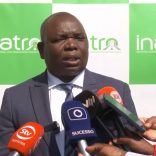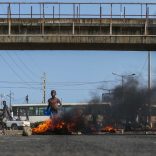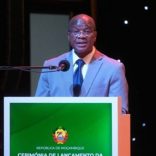Rwanda security forces contingent returns to Kigali after deployment in Cabo Delgado, ...
2017: War, hidden debts and economic stabilisation carry over into next year in Mozambique

Lusa (File photo) / A street in Maputo
The conflict between government and Renamo, hidden debts and regaining international trust and the stabilization of the economy were the themes that marked Mozambique in 2016, and all of them will carry over into next year.
After more than four months, talks to end the crisis between the government and the Mozambican National Resistance (Renamo) continued into mid-December without reaching consensus, once again leaving peace and the continuing work of the international mediation team as key challenges for Mozambique in the new year.
Decentralization, and Renamo’s demand to govern in the six provinces where it claims victory in the 2014 general elections, remains at the heart of the talks and the parties have decided to create a new “flexible, small and competent” group to draft a new document, after the deadline of November 30 to submit a proposal to parliament passed.
“I do not think the war will worsen in 2017, but the Mozambican executive will not have an easy year,” says political scientist and university professor João Pereira, who thinks that the political crisis will continue in 2017, because “it is clear that this process is much more complex [than was thought]”.
According to Pereira, one of the main challenges is to broaden the debate on decentralization to include other players, since the theme calls for a change in “the whole logic of the functioning of the Mozambican political system”.
Despite skepticism and violence between the Defence and Security Forces and the armed wing of the largest opposition party continue in the centre of Mozambique, which has killed an unknown number of people and caused serious damage to the economy in the central region of the country, President Filipe Nyusi of Mozambique and Renamo leader Afonso Dhlakama continue to express their openness to finding a solution.
Mozambique also has to regain the confidence of international partners after the discovery of hidden state-guaranteed debts totalling more than two billion dollars in favour of three state-owned companies contracted between 2013 and 2014.
Following the revelations, the International Monetary Fund and countries supporting the state budget suspended their support, demanding an independent international audit, now underway.
The Mozambican executive has already admitted it is unable to pay the next instalment of its repayments and has requested a restructuring of the debt and a new program of support from the IMF.
However, most creditors say they will refuse to restructure the debts, just months after the conversion of the charges of Emote, one of the companies benefiting from hidden loans, into sovereign debt, and that they will only consider renegotiating after the audit has been completed in February.
The IMF, for its part, has welcomed the austerity measures already taken by the government and the central bank, but said further adjustments would be needed and that a new assistance program would be limited by the Fund’s own rules, which exclude countries with unsustainable debt situations.
Despite the financial framework, the Mozambican economy is expected to show some recovery next year, after IMF-estimated growth of 3.4 percent, less than half the historic averages, in 2016.
At the end of the year, some signs of a recovery in the price of export raw materials such as coal were visible, and the metical, which fell freely against the dollar in 2016, had stabilised. Inflation however remained high and could reach 30 percent year-on-year at the end of December, representing an unbearable increase in the cost of living, especially for the most vulnerable.
The IMF has also signalled that it would make its assistance contingent on difficult and unpopular measures such as the end of government subsidies on consumer goods, wage restraint and risk assessment of public enterprises.
The government, which is introducing legislation to accelerate projects still dependent on the final decisions of the main consortia, also expects that the multiplier effect of investments in natural gas in the Rovuma basin will restore economic indicators to historic levels.












Leave a Reply
Be the First to Comment!
You must be logged in to post a comment.
You must be logged in to post a comment.